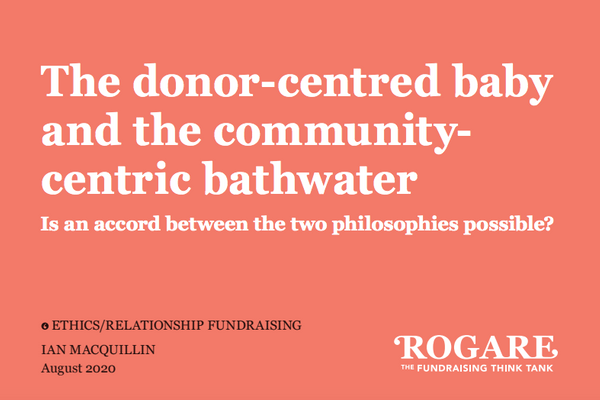
Bulgarian nonprofits face restrictions to foreign funding under new proposals
August 5, 2020
Coronavirus impact to cost UK charity sector 60,000 jobs
August 27, 2020The community-centric fundraising movement may be challenging the principles of donor-centred fundraising but these challenges should be accepted and used as a way to reinvent the traditional approach, a new discussion paper from Rogare has put forward.
While donor-centred fundraising aims to inspire donors by making them feel good about their giving, the community-centric movement is grounded in equity and social justice and prioritises the entire community over individual organisations. It associates several negative outcomes with the donor-centric approach, including the marginalisation of ‘others’ and crowding out of the voices of the communities charities claim to serve, the perpetuation of white saviourism and the fuelling of systematic injustice.
A newly published discussion paper by fundraising think tank Rogare, The donor-centred baby and the community-centric bathwater, analyses this ‘clash’ of philosophies and explores whether there is enough common ground between the two philosophies for an accord to be struck. While it concludes that there is, it says it is up to each side whether they wish to compromise to reach a consensus.
It argues that rather than seeing them as a threat, donor-centred fundraisers need to take on board the criticisms levelled at them and use them as an opportunity to “reinvent” their fundraising in ways that connect donors to causes while being ethically conscious of the needs of all stakeholders.
It puts forward two possible new directions for donor-centred fundraising: integrated or integrative fundraising, and total relationship fundraising.
The first would integrate donors into beneficiary-focused organisations by connecting beneficiaries with the donors who can help them. This, it argues, could lead to more meaningful relationships with donors.
The second approach, total relationship fundraising, would seek to build relationships with all stakeholders across the community who may be affected by fundraisers’ actions and decisions, and these relationships would be grounded in an ethical consciousness of those stakeholders in terms of their race, their gender, and their economic circumstances.
In the paper, Rogare director Ian MacQuillin, says:
“The clash of community-centric vs donor-centred approaches is not so much a clash of alternative fundraising approaches that can be settled by presenting argument, evidence and theory in support of one or the other, but a clash of ideologies about the purpose of philanthropy, and fundraising’s role within that.”
“However, there is sufficient common ground between the two philosophies to enable a dialectic that could result in new ethical and practical approaches to fundraising. Rather than being an existential challenge to donor-centred fundraising that is sounding its death-knell, community-centric fundraising may actually provide the impetus and incentive for donor-centred fundraising to reinvent itself.”
Commenting on the paper, British fundraising consultant Craig Linton, who is leading a Rogare project to look ‘beyond relationship fundraising’, said:
“Rogare’s green paper provides an essential framework for all fundraisers to critically examine their approach. As the paper shows, there is much common ground between these two views of fundraising. It is up to fundraisers to create an approach to our work that captures the best of both worlds. We all have a duty to raise money in a way that recognises the needs of all stakeholders.”
The paper can be downloaded from the Rogare site.




